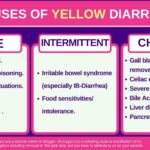Why is your Stool Never Solid anymore? 7 Causes of Chronic Loose Stool.
Our content is not intended nor recommended as a substitute for medical advice by your doctor. Use for informational purposes only.
1. Irritable bowel syndrome with diarrhea.
Irritable bowel syndrome is a digestive system disease characterized by recurrent abdominal pain and bowel changes.
IBS is a functional disease. Functional means that the doctor couldn’t find anything wrong in the colon and stool by investigations.
It is one of the most common diseases. About 10-15% of people worldwide have IBS (reference).
IBS is a chronic abdominal pain and stool changes (diarrhea or constipation) syndrome.
Diarrhea-predominant IBS is a widespread reason why your poop is not solid anymore.
IBS is an underdiagnosed condition. Only 40% of people matching the diagnostic criteria of IBS seek medical advice (reference).
This leaves 60% of IBS sufferers unaware that they have such a condition.
Symptoms suggestive of IBS include:
- Abdominal pain is often recurrent or constant (occurring at least one day per week for the past three months).
- The pain is related to bowel movements (either improves or worsens with bowel movements).
- The onset of pain is associated with either diarrhea or constipation.
- Constant diarrhea can occur in the IBS-Diarrhea subtype.
- Gas and bloating.
- Mucus in the stool.
- Certain foods and anxiety often trigger the symptoms of IBS.
- No signs of inflammation or infection, such as fever, vomiting, or weight loss.
2. Lactose intolerance.
Lactose is a type of sugar mainly present in milk and other dairy products.
Lactose intolerance is the most common form of food intolerance. Studies show that around 25% of white people have lactose intolerance (reference).
Shockingly, lactose intolerance may affect up to 90% of other races, such as blacks, Native Americans, and Asian Americans (reference).
If you regularly consume milk or dairy products, lactose intolerance may be why your stool is never solid anymore.
What causes lactose intolerance?
The lactose sugar needs an enzyme called (lactase) to be digested and absorbed. Lactose intolerance occurs when your small intestine cannot produce enough (lactase) (reference).
The lactase enzyme deficiency can be:
- Primary lactase deficiency: is a hereditary disease leading to gradual loss of lactase enzyme function (most common cause).
- Secondary lactase deficiency: due to injury to the intestinal mucosa as with gastroenteritis, celiac disease, IBD, chemotherapy, or antibiotic use.
Symptoms suggestive of lactose intolerance:
- Loose stools or diarrhea.
- Stomach pain.
- Bloating and distension.
- Passing too much gas (flatulence).
- Nausea after eating dairy products.
- Fullness and early satiety.
- Vomiting can occur in severe cases.
- Less commonly: Headache, muscle aches, joint pain, mouth ulcers, and impaired concentration (reference).
Lactose intolerance is a widespread condition. So, consider consulting your doctor if you consistently get so much gas all the time.
Also, you can run a small experiment by eliminating dairy for a week and notice the changes in gas amounts. Then, tell your doctor or nutritionist if cutting lactose improves your condition.
More: What happens if you ignore lactose intolerance?
3. Other types of food intolerance.
Food intolerance affects up to 20% of the population. This means one in every five people will be intolerant to one or more types.
Developing intolerance can be as soon as after birth or later in life at any age. For example, intolerance can be why your poop is not solid anymore.
Symptoms:
- Loose stool or diarrhea.
- Bloating, excess gas, and flatulence.
- Abdominal pain.
- Nausea and sometimes vomiting.
- Heartburn.
Common types:
- Lactose intolerance:
Present in milk, ice cream, mustard, and some types of cheese. - Fructose intolerance:
Present in many fruits and honey. - FODMAPs intolerance:
It affects people with IBS. FODMAPs refer to “Fermentable Oligo-, Di-, Monosaccharides, and Polyols. FODMAPs are a group of short-chain carbohydrates that cause gas and digestive disturbances. They are present in various foods, vegetables, fruits, and artificial sweeteners. Learn more. - Caffeine intolerance:
Caffeine in coffee, tea, and chocolates is one of the most common causes of constant diarrhea. In addition, caffeine is usually abused in large amounts, which raises the risk of diarrhea. - AIcohoI intolerance:
Too much alcohol intake leads to loose stool or diarrhea; some are high in FODMAPs and can trigger IBS symptoms.
- Gluten intolerance:
It causes Celiac disease (see later) and another milder form called “Non-celiac gluten sensitivity.” - Amines intolerance:
Bacteria produce amines during food storage and fermentation. - Salicylates intolerance:
Salicylates are naturally occurring chemicals. They are present in various foods, including fruits, vegetables, coffee, and teas. - Sulfite intolerance:
Sulfite is used as a natural preservative for foods. - Food allergy:
Some foods can cause more severe allergic reactions, such as Nuts, peanuts, raw meat, seafood, mustard, rice, and some fruits and vegetables.
4. Celiac diseases.
Celiac disease is a common condition affecting 1% of the world’s population.
With celiac disease, your body is intolerant to ” gluten ” protein” Gluten is found mainly in:
- Wheat and wheat-based foods such as bread.
- Rye.
- Barley.
A small intestinal inflammation with malabsorption develops after eating gluten-containing foods. The poop of the person with celiac disease is often loose or watery. It is never solid anymore.
Symptoms suggesting celiac disease:
- The usual age of onset is between 20-30 years of age. But it can occur in older generations up to 70 years.
- Abdominal pain and bloating.
- Constant diarrhea.
- Diarrhea can also be intermittent or not present. Constipation can also occur.
- Nausea and vomiting.
- Weight loss.
- Easy fatigue and iron deficiency anemia.
- Itchy, blistery skin.
- Osteoporosis and osteomalacia (body aches).
Celiac disease is diagnosed by a blood test or biopsy of the small intestine.
Call your doctor if you suspect celiac disease. Learn more.
5. Small intestinal bacterial overgrowth (SIBO).
Small intestinal bacterial overgrowth (SIBO) is an abnormal increase in the bacteria inside your small intestine.
SIBO results from certain diseases such as Crohn’s disease, diabetes, antibiotic use, or specific surgeries.
SIBO leads to a complex of symptoms:
- Abdominal pain.
- Bloating and too much gas all the time.
- Diarrhea or loose stool.
- Nausea or vomiting.
- Loss of appetite.
- Weight loss, malnutrition.
SIBO is widely recognized nowadays due to advancements in its diagnosis. However, SIBO is still underdiagnosed in many countries.
Also, SIBO is linked to many other digestive diseases, such as IBS. So talk. So talk with your doctor about the possibility of SIBO as a cause of too much gas.
6. Chronic digestive infections.
Recurrent or persistent infections can lead to constant diarrhea. The most common persistent infections that can cause diarrhea or loose stool (reference):
- Closteroides difficile.
- Aeromonas.
- Giardia.
- Amebae.
- Campylobacter.
- Cryptosporidium.
- Cyclospora.
- Whipple’s disease.
This form of diarrhea is usually severe watery, and constant diarrhea for years. In addition, it may lead to complications such as malabsorption and weight loss.
Chronic infectious diarrhea is more common in people with weak immune systems. Examples are patients receiving chemotherapy, immunosuppressive medications, and people with HIV.
Your doctor usually needs to do a stool culture or take an aspirate from the small intestine or the colon to detect the causative organism.
7. Bile acid diarrhea.
Bile acid diarrhea (BAD) is one of the most underrated causes of chronic diarrhea or loose stool.
Usually, your small intestine reabsorbs more than 95% of bile excreted from the liver through the gallbladder and bile duct (reference).
Excess bile acid secretion leads to Bile acid diarrhea.
It is a common condition, affecting about 1% of the population.
Symptoms:
- Recurrent diarrhea and consistent loose stools.
- Extreme urgency: a sudden severe urge to poop.
- Extreme urgency may lead to soiling accidents (stool incontinence) in some people.
- Unlike IBS, diarrhea can occur at night (it awakens you from sleep).
- Abdominal pain and stomach gurgling after meals.
- Bloating and flatulence.
Loose non-solid stools alone without attacks of intense diarrhea with urgency are unlikely to be due to BAD.
The treatment of bile acid diarrhea is a bile acid binder called cholestyramine (Questran). We discussed the issue of BAD and its relation to IBS-D in-depth HERE.
8. Inflammatory bowel disease (IBD).
Inflammatory bowel disease refers to 2 significant conditions:
- Crohn’s disease: Unexplained inflammation and ulceration at any part of your gut (from the mouth to the anus).
- Ulcerative colitis: Unexplained inflammation and ulceration affecting the large intestine only (the colon and the rectum).
According to the CDC, about 1.8 million U.S. adults (0.9%) had inflammatory bowel disease.
Symptoms of IBD:
- Chronic or recurrent loose stool or diarrhea.
- Abdominal pain.
- Blood or blood and mucus coming out with or without a stool.
- Weight loss.
- Generalized fatigue.
- Fever may occur.
- Loss of appetite.
Suspect IBD if you have a prolonged history of abdominal pain, mucus, constant diarrhea, and blood in stool without apparent cause.
The main differences between Crohn’s and ulcerative colitis are summarized below.
| Type | Crohn’s Disease | Ulcerative Colitis |
| 1- Site | Any part of the GI tract (from the mouth to the anus) | The colon and rectum. |
| 2- Lesions | Deeper, it can involve all the layers of the GI wall. | Usually superficial (only in the innermost layer) |
| 3-Predominant symptom | Crampy abdominal pain | Bloody diarrhea. (can be constant) |
| 4- Complications | Fistulas, abscess, intestinal obstruction | hemorrhagic toxic megacolon. |
| 5- Risk of colon cancer | Slight increase | Marked increase |
Ulcerative colitis and Crohn’s disease are major diseases that require medical care and follow-up.
Consult your doctor if you have a long history of recurrent abdominal pain and constant diarrhea with blood and mucus in stool.
9. Medications.
Diarrhea or loose stool for long periods can result from your medications. Diarrhea is a documented side effect of over 700 medications (reference).
Common medications that can cause constant diarrhea:
- Antibiotics: Any antibiotic can kill the beneficial bacteria inside your colon.
- Some anti-diabetes medications: Metformin and gliptins (vildagliptin, sitagliptin, and others), can cause diarrhea and stomach gurgling.
- Laxative overuse.
- Stomach/GERD medications: PPIs (as omeprazole, esomeprazole, and pantoprazole) and H2 blocker inhibit stomach acid. This inhibition will allow for the overgrowth of bacteria inside the small intestine and colon, causing stomach gurgling and diarrhea.
- Others, such as chemotherapy immunosuppressive medications, can also cause such conditions.
The complete list of medications causing diarrhea is HERE and HERE.
10. Others (infrequent).
- Colorectal cancer.
- Lymphoma.
- Mesenteric ischemia.
- Previous minor intestinal surgery with removal of a part of the intestine.
- Hyperthyroidism.
- Chronic pancreatitis.
- Diabetes-related diarrhea.
- Cystic fibrosis.
- Radiation colitis.
- Deficiency of the blood supply to the intestine {mesenteric ischemia}.
- Rare causes include Whipple’s disease, tropical sprue, amyloidosis, hyperparathyroidism, and Addison’s disease.
- Evidence-based
- Written by a doctor.






